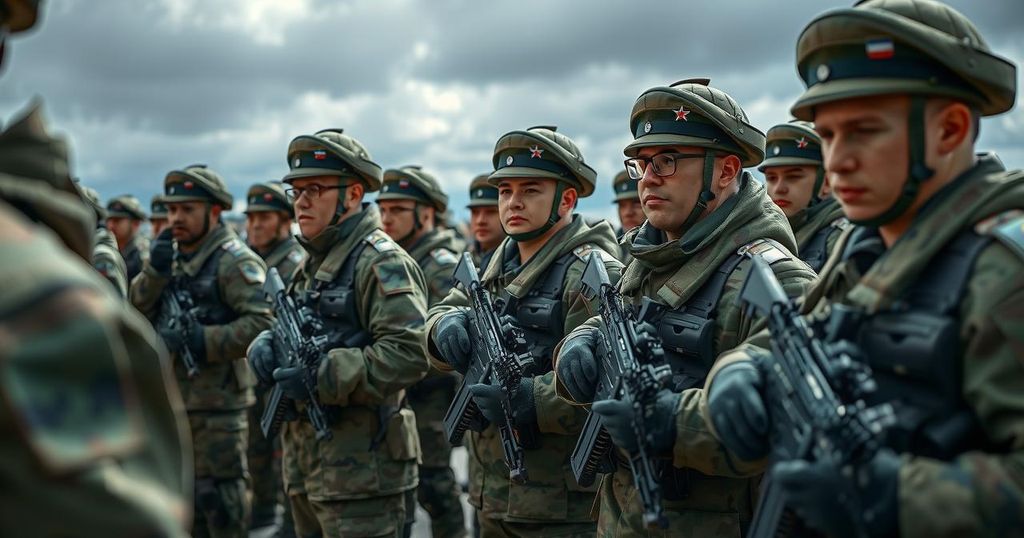World news
11TH CORPS, ASIA, CANCIAN, CENTER, CENTRE FOR STRATEGIC AND INTERNATIONAL STUDIES, CSIS, DEFENCE, ENERGY INFRASTRUCTURE, EUROPE, EUROPE/ASIA, KOREA, NORTH, KOREAN PEOPLE ' S ARMY, MARK CANCIAN, MICHAEL MADDEN, MILITARY, MILITARY STRATEGY, MOSCOW, NORTH AMERICA, NORTH KOREA, PYONGYANG, RUSSIA, STORM CORPS, THE PENTAGON, UKRAINE, UNITED STATES, US, WAR, WASHINGTON
Ethan Kumar
0 Comments
Assessing North Korean Troops’ Role in the Ukraine Conflict
Recent reports indicate that North Korean troops have begun engaging in combat in Ukraine, contradicting earlier beliefs that they would serve non-combat functions. Despite their lack of recent combat experience, elite units from North Korea could bolster Russian military efforts. This deployment raises concerns for South Korea, as it may alter the balance of military power in the region and potentially escalate tensions on the Korean Peninsula.
In light of recent developments, reports have surfaced indicating that North Korean troops are actively engaged in combat operations in Ukraine, contrary to earlier speculation regarding their potential deployment for non-combat roles. Initial estimates of troop deployment numbered around 11,000; however, new estimates suggest that the actual count could be as high as 100,000. The situation remains ambiguous due to a lack of transparency from both Moscow and Pyongyang, making it challenging to ascertain the true scale of involvement. Experts assert that while the Korean People’s Army (KPA) boasts substantial numbers, with approximately 1.28 million active personnel, they lack recent combat experience. Mark Cancian from the Center for Strategic and International Studies stated that the North Korean military might be “thoroughly indoctrinated but with low readiness.” Nonetheless, intelligence suggests that elite units such as the 11th Corps, known for their skills in infiltration and sabotage, are being deployed, potentially enhancing North Korea’s effectiveness on the battlefield. Moreover, reports of North Korean troops receiving additional training from Russian forces have surfaced, indicating a strategic move by Russia to bolster its combat capabilities amid ongoing personnel shortages. As the conflict progresses, these North Korean soldiers could emerge as some of the most capable forces available to Russia, according to retired South Korean Lieutenant-General Chun In-bum. Conversely, some analysts highlight the potential complications introduced by language barriers and unfamiliarity with Russian military systems, suggesting that North Korean troops might be better utilized in support roles rather than direct combat. The motivations behind this collaboration between Moscow and Pyongyang appear multifaceted. Analysts posit that Russia is primarily in need of manpower, while North Korea benefits financially and technologically from this arrangement. South Korea has expressed significant concern regarding North Korea’s increased military capabilities, especially as tensions on the Korean Peninsula escalate. The North’s military involvement in Ukraine poses not only a direct threat to Ukraine but also raises alarms about shifting dynamics in regional security for South Korea as well.
In October, rumors began circulating about the deployment of North Korean troops to support Russian military efforts in Ukraine. Initially, there was skepticism regarding their combat readiness; however, subsequent revelations from the United States and Ukrainian intelligence suggested that North Korean forces had indeed participated in combat scenarios. This shift in understanding necessitated a re-evaluation of their capabilities and roles within the conflict, especially as evidence of their training and potential effectiveness surfaced.
The presence of North Korean troops in Ukraine marks a significant escalation in the complexity of the war, intertwining geopolitical concerns and regional security dynamics. The potential for North Korea to leverage monetary and technological gains through its involvement complicates the matter further. Meanwhile, the implications for South Korea remain worrisome as they navigate heightened tensions and the evolving military landscape in the region. Monitoring these developments will be critical as the situation unfolds.
Original Source: www.bbc.com




Post Comment